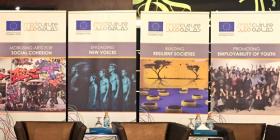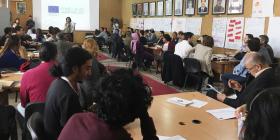Higher Education and VET in artistic disciplines and in cultural policies and management

INTRODUCTION
One year ago, participants from Egypt, Jordan, Lebanon, Morocco and Tunisia - representatives of ministries, academics as well as cultural operators - met in Beirut in order to discuss several aspects relative to higher education and VET programmes in cultural policies and management and in artistic disciplines. Discussions revolved around five main concerns:
- The availability and quality of university programmes providing degrees/modules/courses in artistic disciplines;
- Education in policies and cultural management as a recent field in the region;
- Certification and employability;
- Mobility and exchanges, and prospects for partnerships;
- Discussions, recommendations and definition of a course of action to advocate for reforms.
A number of recommendations as well as proposals for concrete actions resulted from the discussions (see Annex 1), which included the establishment of a regional platform gathering universities, training centres and cultural operators. Rather than setting up a 'physical' structure, this initiative could be a hub to facilitate networking amongst the main players involved in the field of higher education in cultural policies and management and artistic disciplines in the region. The region has witnessed a number of initiatives that could serve as an inspiration for this Platform in terms of methodology and thematic content, whilst other projects could contribute to the debate, such as the ENCATC netwrosk which has played an important role in connecting universities and training centers in the field of cultural management and policies in Europe and beyond.
In February of this year, an Open Call was published inviting interested people to apply to join the Platform. We received 171 applications from which 35 people were selected. They have varying profiles and some of them come from other sector besides culture. The objectives of this Platform take these profiles into account.
In addition to these participants, we have invited representatives of organisations and networks that have played an important role in the region in the field of higher education and training, and these will contribute their experience and results and propose courses of action and modalities that could be helpful for the group and for shaping this Platform.
Med Media, our partners in this activity, have invited a number of representatives of public media in the region to partake in the debates. The aim is to consider ways in which public service media could improve their coverage of cultural activities and enhance the appeal of national culture amongst youth audiences. The event will also serve to forge closer links between media and cultural institutions, thereby improving the flow of information and expertise between these sectors.
This activity will take place at the University Mohammed V of Rabat, where an active educational team has recently launched a master in cultural management, which they will share with their peers during the meeting.
The aims of this Regional Platform are multiple:
- To exchange and network amongst academics, trainers, cultural practitioners, and institutions with the view to develop effective partnerships in cultural management and cultural policies training/educational programmes in the region.
- To address quality of curricula and training programmes in cultural management and policies and artistic disciplines, taking into account the changing needs of the culture sector as well as the crosscutting dimension of culture - sustainable development, tourism, planning, etc.
- To narrow the gap between the academic offer and market demands whilst paying attention to innovative actions and tools (IT, online courses…)
- To raise awareness of the value of education in arts and culture and the necessity to address it within a formal and informal framework at national level.
- To create links between media and cultural institutions, thereby improving the flow of information and expertise between these sectors the media
It proposes to achieve the following:
- A regional platform for exchanges, networking, partnership building and facilitating mobility of students, researchers and teachers within the region is established.
- Concrete recommendations for new programmes and products that meet contemporary standards and address market demands more effectively.
- Concrete recommendations for putting new focus on culture and arts education initiatives for youth and children are put forth.
- A broad base of a community of practice gathering trainers, policy-makers and professionals serving the professionalisation of the cultural field.
- The regional platform embraces improved media engagement and information-exchange as a core goal.
BACKGROUND INFORMATION
This meeting of the Regional Platform is inscribed within a wider action - Higher education, vocational training and lifelong learning in the field of artistic disciplines and policies and cultural policies and management, including certification, and their impacts on employability. This action includes a number of activities and targets primarily representatives of ministries but also academics as well as key cultural operators who are experienced in this field and others who represent the younger generation.
These activities include mainly studies and coordination/technical meetings:
- Study 1 - Mapping of higher education, VET and lifelong learning programmes in the artistic fields
- Study 2 - Mapping of education in cultural policies and management in the region
- Study 3 - Mapping of employability in order to identify possibilities/potentials for integrating the cultural professions; regulatory frameworks with regards to cultural operators and professionals; syndicates; identification of potential for the culture sector, namely within the private sector; potential for and implications of self-employment.
- P2P regional workshop to discuss the quality of university programmes providing degrees/modules/courses in artistic disciplines and in cultural policies and management, employability in the culture sector, and build on recommendations to propose a concrete course of action (organised in Beirut in April 2016).
- Two complementary workshops Training-of-Trainers in cultural policies and management.
PROCEEDINGS OF THE MEETING
The meeting is organised over two and a half days. It will include presentations of key findings and recommendations of the three studies mentioned above and ample time will be granted for discussions around the three axes of this meeting: development and skills review, innovation and cutting-edge tools and the integration of youth.
The first day will include introductions of the participants, which is extremely crucial to establish the group dynamic. A presentation of evidence-based findings and recommendations on the situation of higher education and VET in cultural policies and management and in artistic disciplines will follow. Guest participants will also be invited to provide witness accounts of their involvement in academic programmes and training in cultural policies and management in the region, highlighting lessons learned and promoting their own recommendations on the subject. Following these presentations, participants will break into working groups to discuss three themes: the development of curricula and the definition of skills pertaining to the sector; advocacy as a learning experience; and innovative educational initiatives
The morning of the second day will focus on employability with a presentation of main findings and recommendations of the study. A discussion of three aspects of this theme will follow when participants will break into three groups who will focus on access to education and training; matching skills to market demands and the integration of youth in the workforce; and the role of the media in advocating for culture amongst youth. The afternoon session revolves around how to mainstream culture in other educational sectors, particularly development studies, communication studies, and pedagogy as well as educational studies. This session is very cross-cutting and will also include advocacy for culture and communication and media involvement.
The third morning will wrap-up this first meeting by defining priorities to be addressed in terms of short/medium term solutions, defining concretely the role of the Regional Platform within a future perspective - advisory, facilitator, negotiator for policy design, etc., revising the proposed objectives as needed. The date of the next meeting will be decided at the end of the session.
----------------------------------
Med Culture aims to take the results and conversations of this South Mediterranean Regional Platform to the next step in November 2017. Experts and professionals from European and International universities who are interested in taking part in this debate and networking initiative are invited to contact us at info[@]medculture.eu






